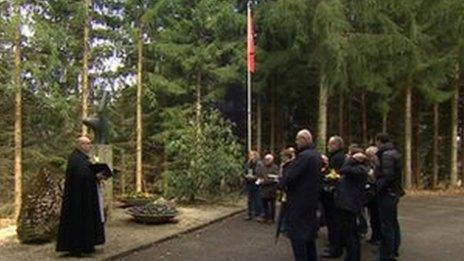Man tells of axe escape from Basel plane crash
- Published
Ben Gillow said he is still "processing" the crash, when 108 died, 50 years later
It has been 50 years since communities in Somerset were devastated by a plane crash in Switzerland.
Nearly 140 people, mainly mothers, boarded Invicta Airlines flight 435 at Bristol Airport heading for a shopping trip to Basel. One victim has recalled the horror of the flight and his escape.
"I remember the weather was good, it was a normal, cheerful, chatty day.
"Everyone was excited and looking forward to going and having a wonderful day in Switzerland," survivor Ben Gillow said.
"There was nothing eventful on the flight until we got to Basel, and I remember it was snowing very heavily. Out of the window was just white everywhere, it was a blizzard," he said.
Mr Gillow was a passenger with the third annual outing for members of Axbridge Ladies Guild, who were joined by women from Cheddar Mums' Night Out group, skittles players from Wrington and Congresbury, plus friends and relatives.
As their plane came in to land at Basel Airport, it met a huge snowstorm. After two unsuccessful landing attempts, it brushed trees and crashed into a nearby hill, breaking into pieces.
In all, 108 people were killed, 104 passengers and four crew members, including both pilots. Just 35 passengers survived, plus two members of cabin crew, one of whom was the only person to escape unhurt.
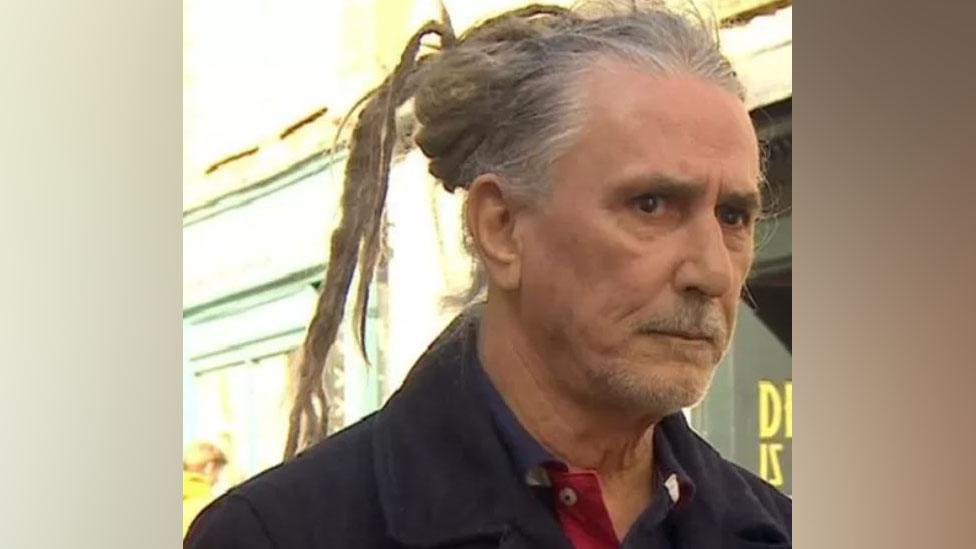
Ben Gillow escaped from the plane crash using an axe
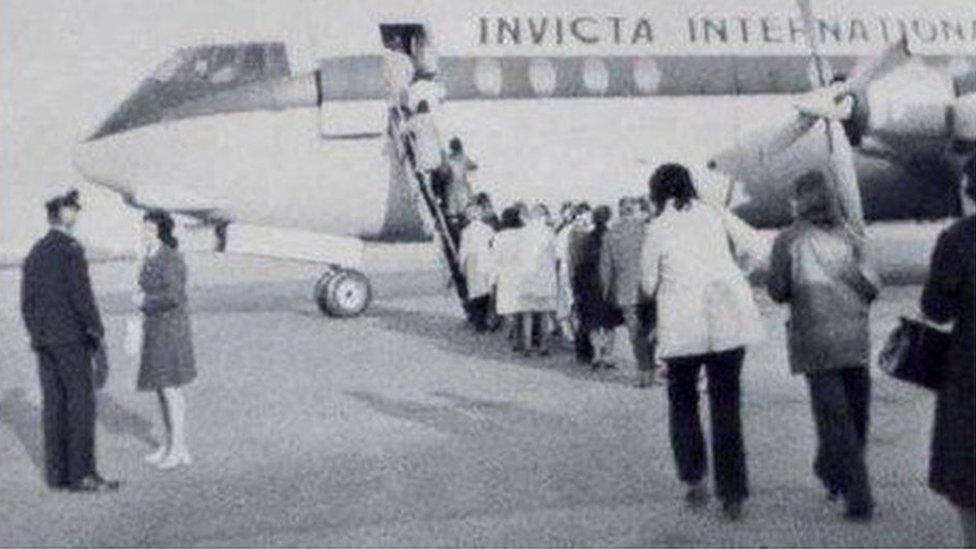
A photograph of passengers boarding the flight was found on the camera of an unknown passenger
Mr Gillow was 17 years old at the time and was working for Unicorn Travel as a tour guide.
He recalled the moment the plane got into trouble.
"I felt the plane trying to touch down and then going up again a few times, then we circled round and suddenly all the lights went out and I was thrown forward, and I remember all the seats going forward, and that was the impact," Mr Gillow said.
'A lot of panic'
"The next thing I remember is being in my seat upside down with the seatbelt holding me. I was at the back of the plane and somebody helped me out.
"I tried to get the back door off but couldn't, so I grabbed one of those emergency axes and broke the door off," he continued.
Mr Gillow said "everything was everywhere" and there was "a lot of panic". He took people away from the crashed plane "just in case it exploded".
"Then, me and a stewardess went back to the plane, got more people, and we got some cigarettes and alcohol from the duty free and, with some wood from nearby, we started a fire to keep everyone warm," he said.
"The snow at this point was still falling. It was so deep it was almost up to my knees. We tried to keep talking and chattering and keep everyone's spirits up," Mr Gillow continued.
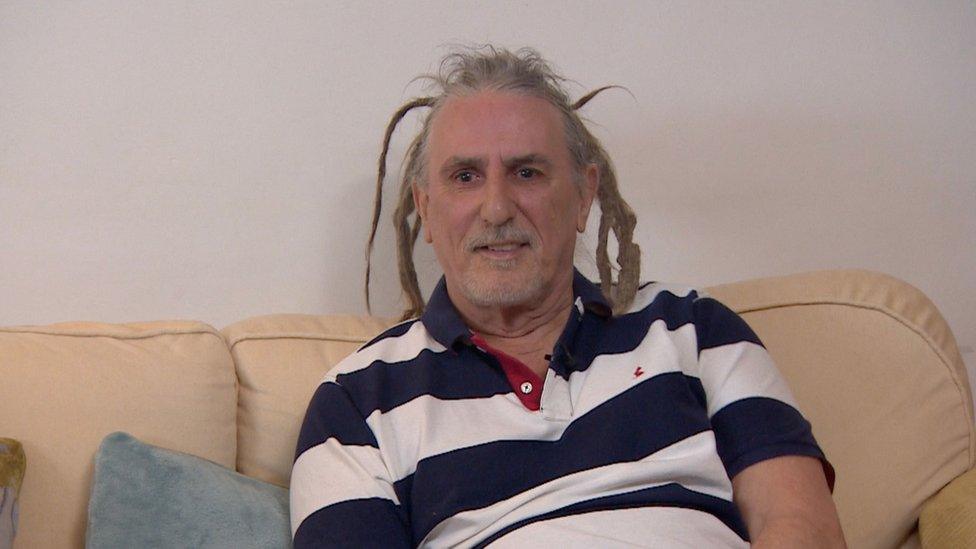
More than 100 died in the crash but Mr Gillow was one of 35 who survived
Then, up on the horizon, Mr Gillow saw a boy out walking his dog. He struggled up to him and in his basic German managed to raise the alarm. They both ran to the nearest village, where the emergency services were called.
Mr Gillow remembered the ambulances and fire engines arriving and a frantic search for survivors.
The next thing he remembered was being in a Swiss hospital. He had fractured three vertebrae in his back and had lacerations on his shoulders and shins. He stayed in hospital for three days before being flown home, where he spent a short time in hospital.
Mr Gillow tried to get back to his job as a travel guide but has never enjoyed flying since the crash. He has also struggled with processing it all, including how he got out alive, which he now puts down to fate.
"Why was I chosen to survive, when someone else, a mother with children, didn't? It must have been awful for them, and yes it would have been awful for my parents but... in that respect I do feel very lucky, lucky to have survived, and gone on to live my life," he said.
'Always there'
"But it is strange, that every year since, at around this time, my mind always seems to start turning over, and I get quite quiet. And I think that subconsciously, it's always there," he added.
An inquiry found the most probable cause of the crash was a loss of orientation by the crew as they relied on instruments and navigational aids in heavy snow and poor visibility.
Other contributing factors included defective equipment which made navigation more difficult.
The 50th anniversary of the crash will be marked with a special service of remembrance, held at the site where it happened.
Many relatives of those who died are expected to be there.
There will also be services held at churches across Somerset.

Follow BBC West on Facebook, external, Twitter, external and Instagram, external. Send your story ideas to: bristol@bbc.co.uk , external
- Published10 April 2013
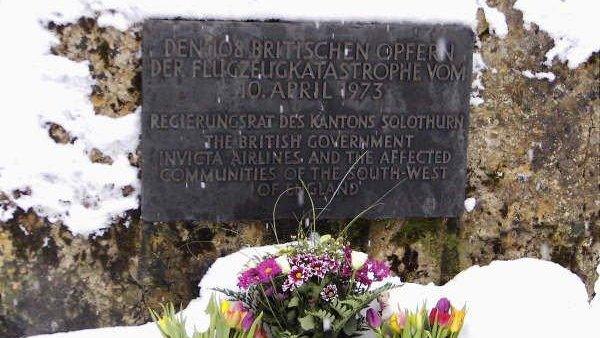
- Published10 April 2013
